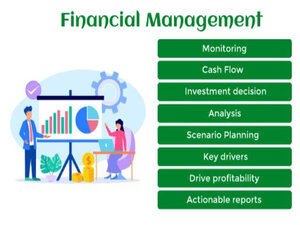Course Overview
When board members and business leaders, both executive and non-executive, have a solid command of financial terminology and processes, they improve their capacity to debate, scrutinize, and evaluate plans and proposals. A solid foundation in financial literacy is essential for the Board to be able to prioritize concerns, make better decisions, and take advantage of opportunities.
This course is designed to give board members, company executives, and senior professionals who have little to no formal finance training the skills and knowledge they need to analyze and question financial data that is pertinent to the board of directors.
The training is extremely interactive and takes into account the individual experiences of each delegate. To bring the sessions to life and aid participants in visualizing the concepts being discussed, numerous case stories from the world of business are included.



Course Objectives
- Recognize budgeting and financial planning
- Recognize the foundations of financial accounting.
- read and analyze financial reports
- Manage costs and cash flow efficiently.
- Putting in place efficient internal control mechanisms
- Make wise and reliable financial choices.
- Apply strategic financial management to improve the effectiveness of budget execution.
- To promote better decision-making, conduct cost analysis and apply strategic management and costing principles.
Organisational Benefits
- Gain from educating your staff about the definition and significance of board effectiveness in businesses, especially if it has any bearing on the main goals, values, mission, and vision of your company.
- Concentrate and target your efforts on the protocol and practices of the Board of Directors.
- By ensuring a connection between the board and operational employees, the business may strengthen its synergy, which will raise employee morale and boost productivity.
- Critically evaluate your organizational capabilities in terms of conformity with the aforementioned principles by conducting a gap analysis and performance audit.
Personal Benefits
- Enhance your performance through increased productivity and enhanced communication with your operational personnel by becoming aware of the effects and long-term benefits of adhering to board norms and procedures.
- Understanding the Board Practice Principles
- Participate in productive discussions about the subject to enhance organizational capability and communication in general.
- Put your knowledge about the effects of board effectiveness in your organization’s context and integrate it.
- Demonstrate knowledge of and comprehension of the key tenets governing the execution of board effectiveness. Training
- Recognize the many individuals, institutions, and organizations that interact with the Board of Directors in an organization, as well as their roles, functions, and responsibilities.
- Determine and assess the primary flaws that contribute to your organization’s board’s inefficiency.
Governance and Board Development Training Highlights
Training Feedback
Happy Customers
Course Outline
Financial Management Overview
- Financial Management’s Purpose
- Financial Management’s Goals
- Responsibilities of a finance manager
- Management of finances is crucial
- Capitals of finance are organized.
- Working capital administration
- Mobilization of resources
- A review of financing possibilities
Financial Preparation
- Setting financial goals and objectives
- Collecting and analyzing financial data
- Creating a financial strategy
- Putting the financial planning into practice and reviewing it.
Financial Management Budgeting
- Recognizing the budgeting procedure
- Budget types and functions
- Budget creation
- Budgetary control
- Monetary restrictions or requirements
Cash Flow Control
- Predicting cash flow
- Consolidated budgets and planning for essential expenses
- Cash flow components
- Money vs. profit
- Managing money
- Management of bank accounts
Controlling costs
- Recognizing different cost kinds
- Components of price
- Costing services and products: cost structures and methodologies
- Procurement
- Cost distributions
Reporting on Finance and Management
- Financial reporting’s importance
- Knowing the components of financial statements
- Income statement, balance sheet, and cash flow statement are all financial statements.
- Handling of accounts
Financial Performance Measurement
- Overview of Financial Analysis
- Financial analysis procedures
- Monetary ratios
- Budget oversight
- Cash flow analysis
Systems for Internal Control in Financial Management
- Financial management procedures for organizations
- Audit’s function
- monetary fraud
- Cross-approvals for financial spending
- Project financial management includes risk management.
Adding Management Reports
- Identifying the essential success criteria for a company
- Measuring affordability, effectiveness, and efficiency
- Key Performance Indicators Development
- Balanced scorecard usage
Who Should Attend
- Senior marketing directors or managers
- Relationship managers and
- Customer relationship managers
- Professionals in customer service, supervisors,
- Team leaders, and managers
- Sales experts, salespeople, and sales analysts
- Entrepreneurs and founders of startups
Trainers Available for:
- In-House Trainings
- Online Training
- 2 Hours Crush Program
- Half Day Program
- One Day Program
- Two Days Full Program
Training Techniques
- Power point Presentations
- Engaging conversations
- Case studies
- Exercises in solving problems
- Focus Group Conversations
- Games in Management
- Skits and modeling the part
Request a Quote

